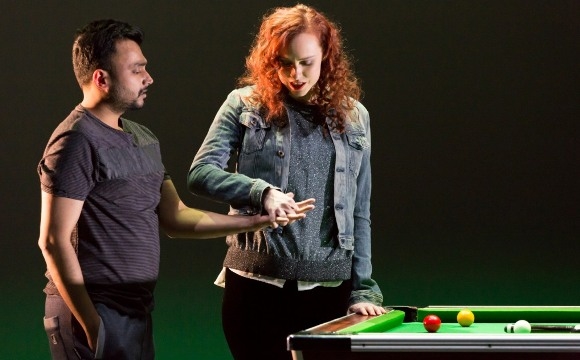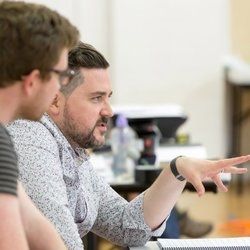
© Stephen Cummiskey
As it turns out, Danish composer Søren Nils Eichberg‘s contribution to Glare is genuinely gripping, thus thrilling in a musical sense. His scoring for just 11 players spills over with originality and aural excitement, and he integrates electronic sounds into his orchestration with arresting mastery – albeit at the service of a deficient drama.
Glare‘s libretto, the work of Hannah Dübgen, is derivative and wafer-thin. Alex’s girl-friend Lea is a robot, a fact that escapes him early on (even though he unwraps her from a polythene cocoon during the symbolic opening moments). Only when he discovers the apparent truth from his scientist friend Michael does Alex start to abuse Lea and ultimately destroy her.
There is a valid message here about the misogyny of male fantasy, but it’s constantly botched in the telling. "Perfect is the least you should expect", coos Lea to her lover, before irritating him by measuring his shouts – "just over 70 decibels".
Small talk, of which there is plenty, doesn’t make for great opera. I haven’t worked out whether Michael’s line "her glands were really hard to make" is intentionally funny, but at least it’s memorable, which is more than can be said for most of the text – although the first-night audience had a chuckle every time the music stopped for a shouted "Fuck off".
'A quartet of first-rate young singers do sterling work'
The best that can be said about Thaddeus Strassberger‘s direction is that it’s a long way from I due Foscari, his previous Covent Garden offering. Well served by the sweeping simplicity of Madeleine Boyd’s designs and some moody lighting by Matt Haskins, the young American creates an effective overall atmosphere but muffs the moments. He seems at a loss to know how to project Glare as theatre, and one can sympathise; but surely he could do more with Amar Muchhala‘s Alex that throw him repeatedly into bed, with or without his robot, or have him play endless games of pool with Michael (Ashley Riches)?
That pool table proves to be Strassberger’s undoing because Riches is so damned good at it. Despite myself I stopped listening and stared as he potted shot after shot. It was impossible to focus on both and the opera lost.
The potential for subtle interplay in Alex and Lea's relationship is sacrificed at the altar of rumpy-pumpy, an entertainment of diminishing returns. (So Alex treats women as blow-up dolls? Get away.) It’s hard to probe his character any further when so little help is given. it’s also hard at times to pick out the pathetic fallacy: how much more does the audience know about Sky Ingram‘s statuesque Lea than Alex does himself?
A quartet of first-rate young singers do sterling work (the fourth is Clare Presland, whose role as Alex’s first wife Christina is underwritten even by these standards). Muchhala plays the bot-botherer with as much complexity as the material allows and Ingram shows yet again why her star is rising fast.
Geoffrey Paterson conducts CROMA in another new opera that’s less than worthy of their attentions, following Gloria – a Pigtale, although they’ll have revelled as I did in Eichberg’s writing. So many exciting musicians, though, are wasted on a Stepford Wives retread whose closing twist would barely pass muster in a story magazine.













